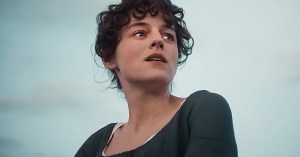Jeffrey Tambor on Transparent Season 3: ‘You’re a Cisgender Male Playing a Transgender Part, You Have a Responsibility’
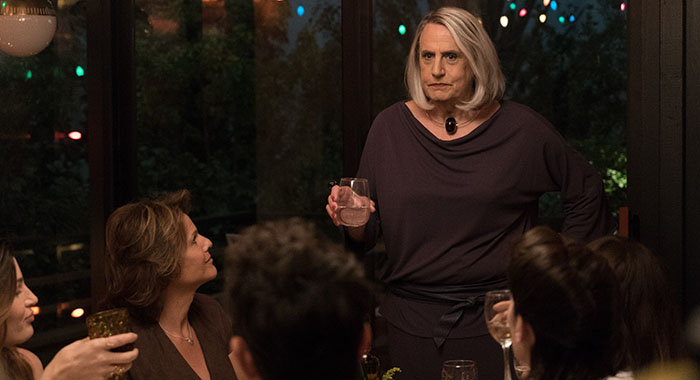
Jeffrey Tambor gets it. Knows he’s found something special, the potential role of a lifetime playing Maura Pfefferman in Amazon’s Transparent, a part that won him his second-straight Emmy for Best Actor in a Comedy Series last Sunday night. He also knows that some in the LGBTQ community may take issue with the fact that, awards or not, he’s still a cisgender male playing a transgender woman.
But Tambor also knows he’s been given a platform thanks to the runaway success of creator Jill Soloway’s acclaimed show — and a responsibility to use it. In his most recent acceptance speech, Tambor implored Hollywood to give trans talent more opportunities both in front of and behind the camera, saying he hopes to be the last cis actor to play a trans part.
With Amazon now releasing season 3 of Transparent, Rotten Tomatoes sat down with the actor at the Toronto International Film Festival, where the first three episodes of the season premiered as part of the festival’s TV-focused Primetime program. Here’s what Tambor had to say about the responsibility he feels to the trans community, the show’s contract with its audience, and why he’ll never stop feeling nervous about playing this part.
Rick Mele for Rotten Tomatoes: It’s a little strange to be talking to you about this show at a film festival, but I guess TV is the new movies, right?
Jeffrey Tambor: You know, when they said you’re going to TIFF, I went, “But that’s a film festival!” It’s such a huge honor for us, because we’re such the little engine that could. So this is really a big deal for us.
RT: Well, the show’s become such a phenomenon.
Tambor: Yeah. I also think it’s a forerunner of things that are happening. I think it’s all going to meld into one — this whole hierarchy of film and television. And there’s so much material. I say, “What are you watching?” and people say, “Well, this, this and this.” And I go, “Holy shit…” It’s so much. You have to understand, when I was a kid, I’d say, “Mom, I’m doing a television show.” And she’d say, “Is it on [Channel] 2, 4, or 7?”
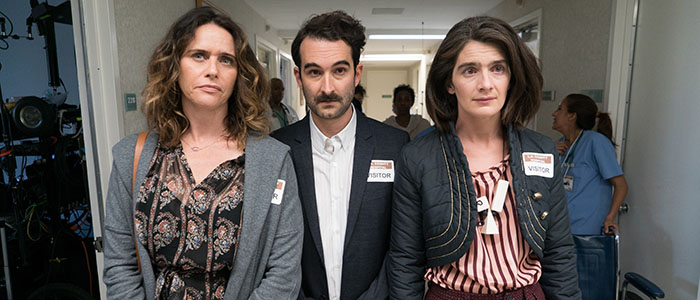
RT: But when a show does a take off like this and become a “thing,” you still get that shared experience of everybody talking about it and writing about it.
Tambor: Yeah, we’ve gotten it good. And people coming up to you and talking to you. Just in this hotel. People will come up to you and start talking. It’s very interesting. It might be streaming, it might be the nature of our show, which is very personal and familial. But people just start talking, and they start talking about their families. Not everybody. I’m just saying, it’s not an uncommon experience.
I think it’s what Jill is saying. There is an unstated contract between our show and the audience that is saying we do not underestimate you. You can watch this the way you want to watch it. And you can respond to this the way you want. You want to laugh, laugh. You don’t want to laugh, we have no laugh track. We’re not punching up for you, we’re not overexplaining. Here it is. I like that contract. I have never said what I just said in any interview.
RT: Well, not to say that your other projects haven’t been rewarding, or that they haven’t had loyal followings — I know you’re still getting asked about Arrested Development to this day — but does this show feel different in terms of your interactions with fans?
Tambor: Yeah. Something seems to be quite vast. I just did a film in Germany, and I went and bought coffee one day and the woman not only gave me my coffee, but she gave me more coffees and said thank you for the show. And I’m in Cologne. Or somebody coming up to you in London and saying thank you. So this is not just Tribeca in Manhattan, it’s going out [into the world]. This is quite something.
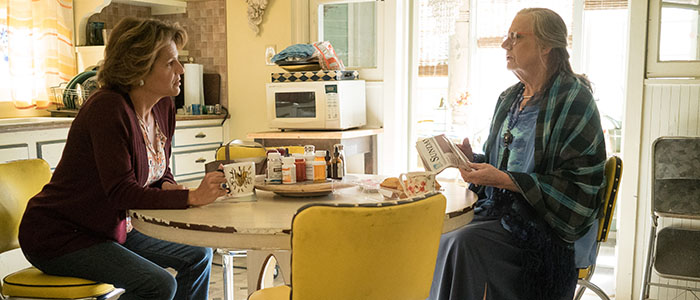
RT: And it seems like, from the outside, at least, that you’ve really embraced that element of the show.
Tambor: Oh, I love it. I used to go down in my basement and daydream about being an actor. And this sort of fulfills, at this age, all those daydreams. Really. It’s quite something. We all kind of just say, “Don’t anybody wake me.” This is quite something. To do something you’re very, very proud of, and that’s over and above you. That the message is over and above you is quite fulfilling. And it’s not didactic, saying, “Listen to us, this is important for you.” It’s about a family, and it’s very funny. And sometimes it’s funny at the wrong times and sad at the right times.
RT: In the past, you’ve talked about your nerves taking on a part like this as a cisgender male. Have those calmed at all now that you’ve got three seasons under your belt?
Tambor: You know, I thought about it today for the first time. And I think what has happened is, I’ve gotten more used to me being nervous about it. I would never say I’m confident. I’m confident in the project. But every scene that I do as Maura is new for me, which I love as an actor, because it’s so challenging; you don’t know how it’s going to come out, and that’s very freeing for me. But I always have that [in my head], Do it right, do it right, do it right. You’re a cisgender male playing a transgender part, you have a responsibility.
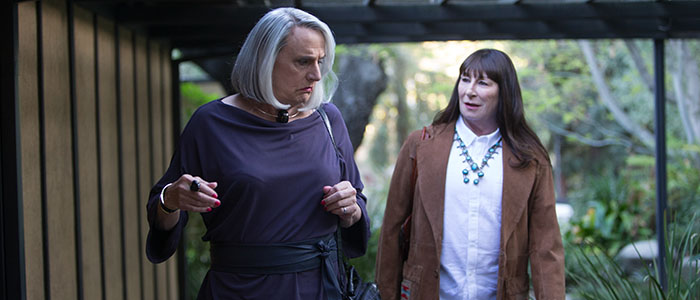
RT: But one of the nice things about TV, as opposed to a movie, is you get to develop a character over a longer period of time. Do you feel like you have a better handle on who Maura is by now?
Tambor: Oh yeah. But also, I always tell Jill, “Don’t tell me too much.” I like to be surprised. Because every day in Maura’s life is a surprise. Maura doesn’t know how to do makeup correctly; she doesn’t quite know how to navigate across the street. When she goes to the LGBTQ community center, those are not her peers. They’re younger, they’re kids, they’re pishers. So where does she belong? Who can she trust? Will she have a romantic life? Who will it be with? Will she be happy? Why isn’t she happy? She should be happy. What’s missing? It’s interesting.
RT: If it felt like season 1 and season 2 were sort of Act 1 of Maura’s story, do you feel like we’re getting into Act 2 of it now?
Tambor: I do. I feel like we’re getting on with it. And I think there’s a big thing we’re going to confront [this season]. And we’re going to start season 4, and I’m very interested to see that. You’ll see what happens at the end of season 3… Maura’s hit the wall pretty good. Maura has to make a big decision. So I can’t wait. We start in January, and I can’t wait to see what Jill has in store for us. People have come up to me who have seen it at TIFF and said that they think season 3 is the best. So that’s nice news to wake up to.
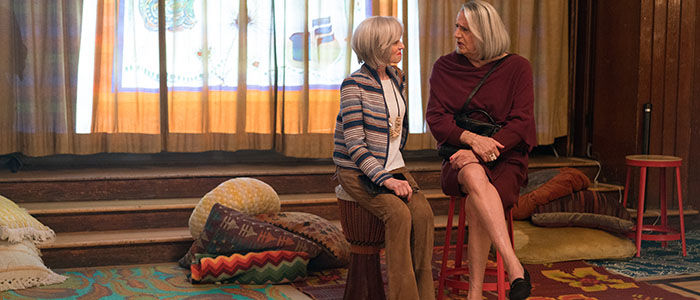
RT: That seems to be the way this show is going. I loved season 1, and wasn’t sure how it was going to be able to follow that up, and then I liked season 2 even more.
Tambor: Well, here’s how courageous Jill is: When somebody has a successful season 1, they give you season 2 plus 10 percent. She just takes it and throws it right at the wall. I think our season 3 is a little lighter and has a little more story curve. It felt like we took a little more time with the scenes and had a little more arc in the scenes.
Tambor: It is the safest set I’ve ever been on. And I was looking at a picture yesterday that somebody took, of all of us just talking, and I went, “My God, that is a family.” And I know you guys hear it so much, “Oh, we’re like a family, blah blah blah,” but we are actually like a family. The genius of this casting, it’s so chemical, what goes on. I feel like those three are my kids. And I feel like Judith [Light] and I are the parents. It’s really odd. Even on the plane: “Oh, where are the kids?”
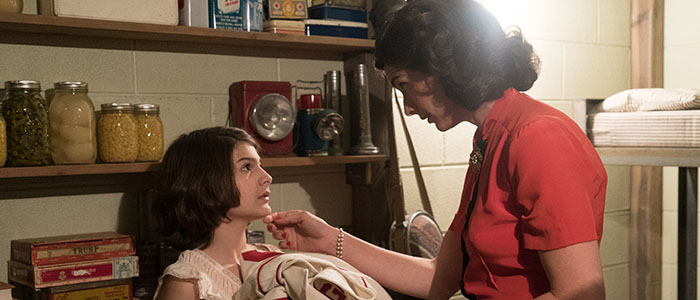
RT: Flashbacks are such an important element of this show, and I know this season we’re going to be getting flashbacks to Maura’s childhood. Obviously, you’re not in those scenes—
Tambor: I haven’t seen them. I wouldn’t even look at the actors. I didn’t want to know about it. I don’t like too much information. I don’t know what that is about me. I read the script, but I didn’t go to the reading.
RT: Did that end up informing your portrayal of the adult Maura at all?
Tambor: No, because that was shot after we arguably had finished. I think there was maybe one more episode, and I can’t say that it demonstrably affected me. I was just very proud of it. Do you like season 3? What’d you see, episodes 1, 2, and 3?
RT: Yeah. And so far, I’ve really enjoyed it. I just wish there were more episodes for me to watch.
Tambor: How’s the first one? I’m nervous about it. I haven’t seen it yet.
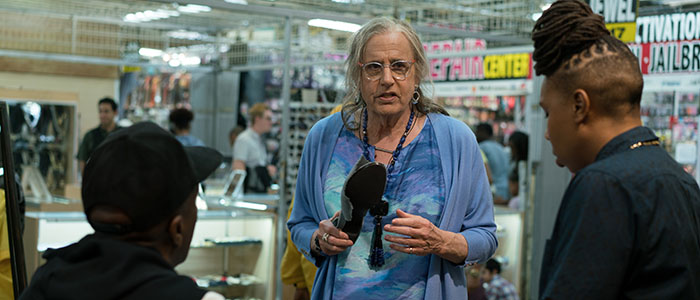
RT: Really good. Very different. Because it’s essentially just your episode, right? It focuses almost solely on Maura.
Tambor: I know. She gets her head turned around in Compton. And then she sees a side of this whole decision that she’s made that she has never seen. She gets slapped awake, Maura.
RT: It feels like that has repercussions for the next few episodes too.
Tambor: Absolutely. That’s all this season, this awakening.





